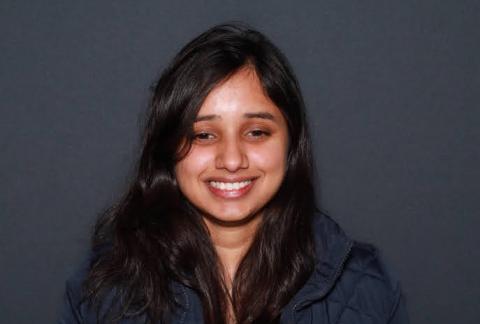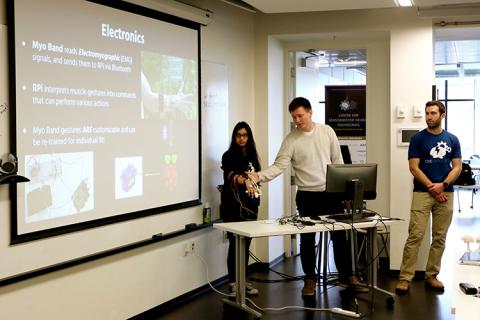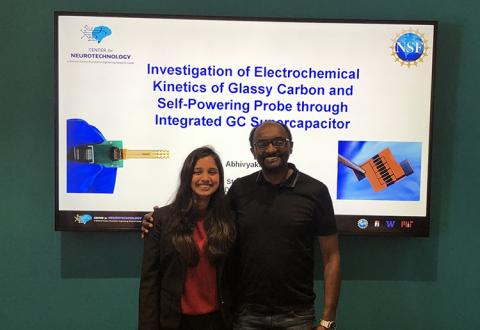Growing up, Abhivyakti (Abhi) Gautam was most excited on Tuesday, because on that day, she could spend a whole additional hour during school playing basketball or tennis. A national level tennis player, Gautam was born in India to the son and daughter, respectively, of two school principals who had both laid the foundation of India’s education system after the country won its independence in 1947.
But it wasn’t until 2012, when she was a sophomore in college, that she had her first encounter with what would eventually become her life’s calling. While watching a documentary on mind control, Gautam was transfixed by interviews of renowned scientists on scientific progress in the field of brain-machine interfaces and how, for example, a paralyzed patient who had long lost the function of her limbs had successfully been able to operate a prosthetic arm by using only her brain.
Today, Gautam has found a way to build a career following that calling. She is embarking on a successful career at Elon Musk’s startup company, Neuralink, which is well known for developing implantable brain-computer interfaces. After graduating from San Diego State University last year with her master’s degree in bioengineering, Gautam secured a position at Neuralink as a process engineer. There, she is part of a team building thin-film neural probes, devices that are similar to glassy carbon neural probes she worked on as a graduate student in the lab of Sam Kassegne, Center for Neurotechnology deputy director and co-leader of the CNT’s Communication and Interface research thrust.
“Here at Neuralink, I get to work on building micron-scale threads that are inserted into the different areas of the brain,” Gautam said. “Each thread contains many electrodes and connects them to an implant, the ‘Link.’”
How did she get to this position so early in her career and successfully combine her interests in medicine and engineering? She paved the way for herself, step by step, through initiative, hard work, securing internships and support from the CNT.
Experiences that build toward long-term goals
After watching the documentary, Gautam had made up her mind to find a way to get exposure to research in the field of neuroscience. Although her college, Netaji Subhas Institute of Technology, had many opportunities for engineering projects in the field of core electronics and instrumentation, Gautam could not find any professors or seniors who could guide her in cognitive science. Not willing to give up, she started looking for research in this field being done in her country and in 2013, secured a summer internship at the National Brain Research Centre, India’s premier neuroscience research institution. She studied MRI images of the brain and devised an approach to identify markers of Alzheimer’s disease, which would help diagnose those early onset patients whom prevalent technology at the time couldn’t identify.
“This experience opened the world of bioengineering to me from a programming lens. As an engineer, I felt very curious about the hardware that augmented human ability,” Gautam said.
She received the perfect opportunity to explore this area with the Institute of Sound and Vibrational Research at the University of Southampton in the U.K. Under professor Stefan Bleeck, she developed hearing aid implants on different computer platforms such as Raspberry Pi and Google Glass.
“All my experience until now was related to finding solutions for patients with an existing disease or condition. This got me thinking if there is a way we could predict the occurrence of degenerative diseases as early as childhood. I found the analysis of genetic data to be key,” Gautam said.
That idea became the focus of her work over the next year, as a research scientist in Germany’s Center for Neurodegenerative Diseases (DZNE).
It was around this time that she began reading a book by CNT Co-Director Rajesh Rao, “Brain-Computer Interfacing: An Introduction.” Knowing she wanted to pursue grad school, at this point, Gautam was contemplating the right field to specialize in. This book proved to be a formative perspective on BCI, the same field that first piqued her interest in bioengineering. She eventually chose San Diego State University for her graduate studies, working on research supported by the CNT in Kassegne’s NeuroMEMS lab.
“CNT does innovative work in development of neural interfaces to improve sensory and motor functions for people with neurological disorders,” Gautam said. “Dr. Sam Kassegne’s work on development of novel electrode materials for sensing and stimulating applications made it an exciting opportunity for me.”
Work in a lab supported by the CNT leads to success
In Kassenge’s lab, Gautam fabricated and tested glassy carbon-based neural probes and calibrated their performance relative to currently used industry standards (i.e. thin-film platinum). In doing so, she gained cutting-edge experience in microfabrication techniques for development of thin-film probes at the SDSU research facility. In addition, electrochemistry-testing work she did in the lab helped her build a strong foundation in predicting functionality of electrode materials for neural probes. Gautam was also a lab manager, which gave her invaluable experience in establishing health and safety protocols in a cleanroom environment and demonstrated her leadership through running training series for new lab members.
Gautam graduated in 2019 summa cum laude from San Diego State University. She had several exciting career paths in mind, and as graduation approached, she knew that the most important aspect for her was to be in the research domain and work on solving real-world problems. Around the same time, Neuralink held its first public launch event where they shared their vision of developing ultra-high bandwidth brain-machine interfaces. Gautam realized that was exactly the kind of work that had sparked her excitement when she was a college sophomore. She applied for a role and was both excited and nervous to learn that she was invited for an interview.
“I was deciding between offers and was expecting Neuralink to be a one-in-a-million shot, given the media attention the event garnered and the volume of applicants they must have received,” Gautam said.
However, much against her original expectations, they shortlisted her and after a competitive interview process, the team was convinced she was a great fit for Neuralink.
“Abhi was a great graduate student with an inquisitive mind and an interest in research that spanned several intersecting fields such as neural engineering and machine learning,” Kassegne said. “Her skills, along with her interest in several areas, will allow her to grow as a leading neural probe design engineer. I think her future in this area is very bright.”
The road ahead
Gautam enjoys the fast-paced collaborative environment at Neuralink and opportunities that come with working at a startup.
“At Neuralink, we go by the motto of learning to fail forward — something I value a lot and have adapted in my working style,” Gautam said. “Working with experts from diverse backgrounds such as neuroscience, electronics, material development and manufacturing — it provides tremendous learning opportunities. It is very exciting to work on challenges and head together towards a common goal of making implants to better human lives. Due to the background I gained from my work with CNT, it was a smooth transition for me and I was able to hit the ground running from day one. “
“I am proud to have Abhi on the microfabrication team as she brings extensive experience in electrode development from her work at the CNT. She is intelligent and has all the great qualities of a Neuralink engineer,” said Felix Deku, who is one of Neuralink’s microfabrication leads. “Abhi’s ability to write a computer program makes her stand out amongst her peers and puts her on a career path that will be envied by many. I expect her to excel and do great things in the future as she continues to learn and explore the field, ask the difficult questions, build on her confidence and keep her motivation high.”
Gautam said that she is excited by the future she is working to build, and it appears that there are only more great things ahead for her.
Visit Neuralink’s website to learn more about the company and Sam Kassegne’s NeuroMEMS research lab website to learn more about CNT-funded research described in this article.



